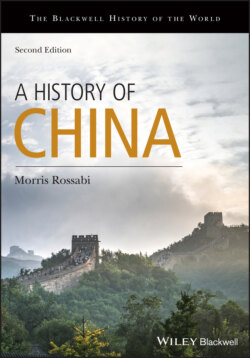Читать книгу A History of China - Morris Rossabi - Страница 31
HUNDRED SCHOOLS OF THOUGHT
ОглавлениеPerhaps even more significant for Chinese civilization was a profusion of new ideas and philosophies that generated the so-called Hundred Schools of Thought, an outburst that coincided with a philosophical flowering in many of the great civilizations of the era. The development of new and vastly influential philosophies in Eurasia during this time is astonishing. In the sixth century BCE, Zoroastrianism developed in Iran, Shakyamuni described the path to Buddhist Nirvana, and (at approximately the same time) Isaiah and Jeremiah prophesied mostly manifold disasters; in the fifth century, Socrates took part in the dialogues that gradually but inexorably revealed his metaphysical and epistemological views; and, from the sixth to the fourth centuries, Chinese philosophy flourished. Pervasive theories about direct links between these intellectual developments have proliferated, resulting in unverifiable and occasionally absurd speculations. According to such often ill-informed hypotheses, Daoism was an east Asian version of Buddhism, and the Buddha was actually Lao Zi, the alleged founder of Daoism, who moved to India after completing his mission in China. A chance overlapping in chronology led to such unsubstantiated and incredible assertions. It is true that comparisons between the various philosophies and religions that originated at this time may prove instructive, but direct links and influences are more difficult to establish.
To be sure, the philosophers and religious thinkers of this era shared some of the same concerns. Both Socrates and Confucius sought to identify the nature of a just society in which each individual recognized his or her position in the social hierarchy and performed the tasks required of that status. The two thinkers also offered visions of the ideal man – an individual of high moral probity for Confucius and a philosopher of superior intellectual abilities and ethical astuteness for Socrates; each emphasized education. They resembled each other even in the style they used to present their views, as each shunned a direct, explicit account of his beliefs. Instead they tantalized their listeners with dialogues or anecdotes from which their philosophies could be gleaned. Similarly, Lao Zi and Siddhartha Gautama, the historical Buddha, both described roads to spiritual enlightenment, an objective they shared, though they differed on the paths they advocated. Each disparaged the rewards of this world as ephemeral, and Buddhism, in particular, perceived human life as engulfed in suffering.
The convergence of some themes in the philosophies and religions of that time does not imply a direct relationship between them. It would have been highly unlikely for Chinese philosophers of this era, for example, to have had knowledge of Buddhism. Comforting and satisfying as it may be to conceive of and actually attest to a link and to mutual influences between these philosophies and religions from different Asian civilizations, there is absolutely no evidence for such inferences.
In addition, the Chinese philosophers of this era were responding to the specific social circumstances of Eastern Zhou China. The turmoil of the Warring States period had overturned not only the social system but also societal values. Turbulence had also caused destruction and death. Under these circumstances, the populace needed solace as well as a new moral code and social system. Thus, philosophies that provided comfort or that offered the prospect of social stability and harmony were likely to find a receptive audience. Two philosophical strains emerged to fill China’s needs. One (i.e. Daoism) sought to comfort a population beset by warfare, roving bands of brigands, and generally chaotic conditions while the other (i.e. Confucianism) presented plans for an orderly society.
The economic and political changes of the Warring States period reverberated in the new philosophies of the time. The seemingly greater opportunities for social mobility were mirrored in opposition to the use of social position as the means of selecting officials. Most of the philosophies emphasized merit rather than birth as the main criterion for recruitment as well as for social advancement. Confucianism, Mohism, and Legalism, three of the principal philosophies that developed in the Warring States period, paid the greatest attention to the individual’s qualifications in assessing his suitability for office. They also judged his moral worth on the basis of his own actions and values, not the circumstances of his birth. According to their thinking, because family status and personal relations would be insufficient to guarantee a prominent position at court, the ruler and his ministers would have a more contractual compact rather than a hereditary, personalized arrangement. Similarly, a number of the leading philosophers, perhaps reacting to some of the inhumane, even malevolent heads of state in the Warring States period, wrote that the ruler himself ought to be subject to the same kind of scrutiny.
The Warring States period thus witnessed the development of the conditions necessary for a unified China and the rise of a new governing class based, in theory, on merit. The hereditary principle for ministers and officials was overturned, and new men rose to positions of authority because of their capabilities. Opportunities increased for them because of the warfare that punctuated the era and that resulted in the deaths of many in the nobility. Since the new men had military, diplomatic, and administrative skills essential for the states seeking to survive these tumultuous times, the various rulers courted them. Simultaneously, ambitious men, who were not part of the nobility, began to supersede the “feudal” lords as landowners, and merchants capitalized on the demand for products that was precipitated by increased contact between the states; these merchants reaped sizable fortunes, creating still another wealthy, non-noble class. The philosophies espoused during this time undermined the rigid hierarchical structure that favored the old elite and instead supported the aspirations of the newly risen commoners and prized competence above birth in the recruitment of officials and rulers.
